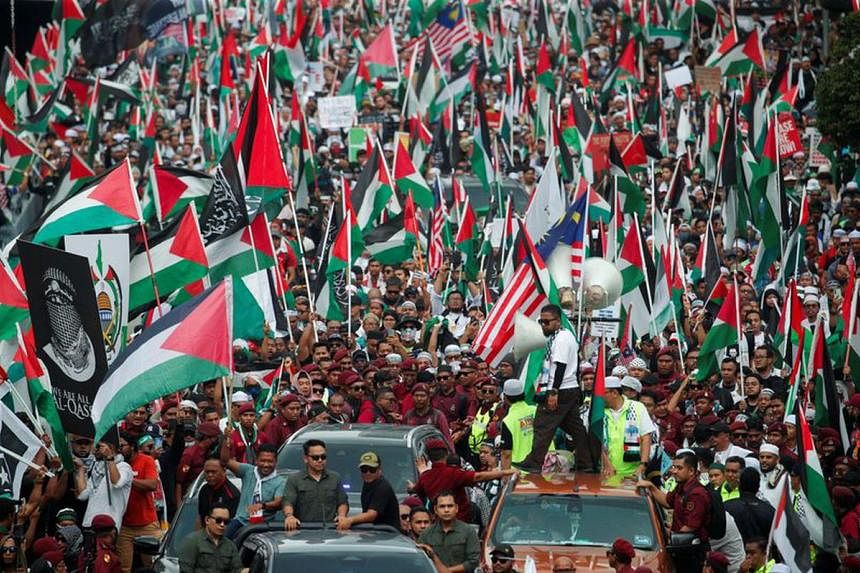KUALA LUMPUR – Lists of companies with alleged ties to Israel or that had purportedly pledged support to it are circulating on social media here, with Malaysians being urged to boycott them amid the Israel-Hamas war.
Among these companies are American food franchises, which are usual targets every time there is renewed conflict in Gaza due to the US government’s pro-Israel stance.
This time, however, some employees are countering the boycott calls, taking to social media to say that these boycotts are affecting their livelihoods.
Some Malaysian politicians have also urged caution in the country’s response to the conflict, in view of a possible impact on trade ties with the West.
Malaysia’s majority-Muslim population’s deep sympathy for the plight of the Palestinians – coupled with strong words by Prime Minister Anwar Ibrahim against the bombing of Gaza by the Israel Defence Forces (IDF) that has killed thousands – have fired up those who hope to push for a ceasefire and help the Palestinians from afar. Now entering its fifth week, the conflict has killed more than 1,400 Israelis and over 9,000 Palestinians.
Malaysians have held big pro-Palestine rallies, with the government designating last week as Palestine Solidarity Week.
Other Malaysians, including celebrities, have said on social media that they need to do more than just hold protests.
Well-known Malaysian entrepreneur Vivy Yusof posted a video on Instagram, saying: “If we think we are helpless, guys, we are really not... Keep praying, keep donating, keep speaking up, keep posting, keep boycotting.”
In the post, which garnered 35,400 likes, she wrote: “I’m not a fan of boycotts, but this time, it’s literally a matter of life and death. If we keep funding the global companies that give to IDF, why would they stop – they will only care if their sales go down.”
There are different lists floating around on social media, with each showing scores of mainly consumer brands.
McDonald’s and Burger King are being targeted after their Israeli restaurants gave free meals to IDF personnel, as reported in the media. According to a Reuters report on Oct 17, McDonald’s Israel said on its social media accounts that it has given thousands of free meals to the IDF. Newsweek reported on Oct 23 that Burger King in Israel posted photos of the company donating food to Israeli solders.
McDonald’s Malaysia issued statements dissociating itself from the Israeli franchise. It said the company in Malaysia is a 100 per cent Muslim-owned entity, and that it had contributed RM1 million (S$286,000) to the Palestine Humanitarian Fund under the Prime Minister’s Department.
In an Instagram video, a deaf McDonald’s Malaysia worker named Izuan said in sign language: “It is not easy for employers to accept those with disabilities like me. I hope the boycott does not continue.”
In another video on social media, one McDonald’s employee said she was shamed for wearing her uniform in public. Another said: “My eight-year-old daughter told me that her friends said my burgers are haram (forbidden for Muslims).”
The video said the boycott was affecting 18,000 McDonald’s workers, as well as food delivery riders.
On Friday, Malaysian police said they arrested two local men over suspicions of hacking the digital menu screen of a fast-food outlet on Tuesday. Selangor police chief Hussein Omar Khan said the police received a report from the outlet manager saying food products had been changed to show blood, bombs, bullets and the words “Proud Sponsors of Israeli Terrorism”.
Some Malaysians are also boycotting coffee house chain Starbucks. They said the American-based chain sued its labour union in the US state of Iowa over a union social media account stating support for Palestinians, pointing to an Associated Press report dated Oct 19.
A barista at a Starbucks outlet in Malaysia who declined to be named said: “Before this boycott, we could get RM30,000 a day (in sales), but now we are lucky to get RM10,000.”
Food and beverage giant Nestle is also one of the names on the list of brands to boycott. According to news reports, it has plants in Israel.
Nestle (Malaysia), which produces food products such as Milo, Nescafe, Maggi and KitKat, said on Thursday in an e-mail response to queries from The Straits Times that its products are made in Malaysia by Malaysians.
“As a global company, we foster mutual respect and tolerance across cultures, religions and nationalities. We are deeply saddened by the current humanitarian crisis in Palestine,” it said.
“We firmly oppose all forms of violence and hope that peace will be restored soon.”
Mrs Amanda Sanusi, a 45-year-old Muslim teacher in Kuala Lumpur, said: “I boycott McDonald’s, Starbucks, Burger King, any brand that has outright declared it supports Israel.
“My children are also boycotting and will update me on any new information on brands that support Israel.”
Responding to reports of the boycott by Malaysians, Palestinian Ambassador to Malaysia Walid Abu Ali told reporters on Friday: “Any measures supporting Palestine and its people are deeply valued. The boycott of Israeli products and franchises supporting Israel serves to minimise the suffering of Palestinians.”
But some have cautioned that the boycott call could have a negative impact on the Malaysian economy, such as a rise in unemployment.
Sabah Deputy Chief Minister Jeffrey Kitingan warned on Oct 29 that there were signs of division among Malaysians in response to Datuk Seri Anwar’s support of the Palestinian cause.
Datuk Seri Kitingan said Malaysia may have harmed its reputation and international relations with the West and was in danger of losing trade relations.
Mr Anwar on Tuesday condemned in Parliament the “relentless, indiscriminate onslaught of Israeli aggression”.
The Premier said he would continue to express the country’s position on the matter.
While he did not take a stance on the boycott calls, he said: “We are a trading nation actively engaged in regional and international commercial and economic activities, proactively reaching out for foreign direct investments to drive our economic advancement. So Malaysia is deeply and profoundly tied to what happens everywhere in the world.”


